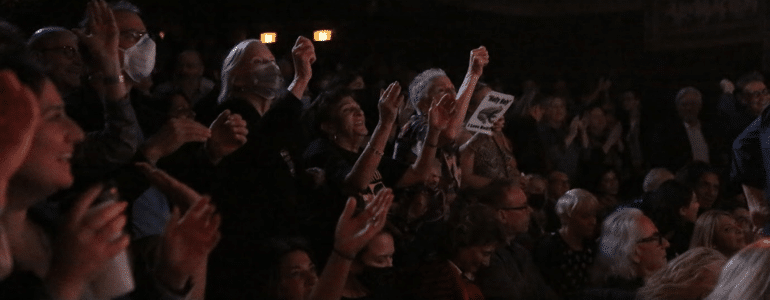GUEST BLOG: Deconstructing a Song with Kleban Prize winner Amanda Yesnowitz
As the story goes, Dorothy Hammerstein once overheard a man at a lavish NYC event extolling the virtues of “Ol’ Man River.” Correcting the fellow, who attributed the song’s genius to Jerome Kern, she interjected sassily: “Jerome Kern wrote ‘dum, dum, dum-dum.’ My husband wrote ‘Ol’ Man River’.”
Historically, lyricists get the short shrift. But the truth is that when we’re doing our jobs most compellingly, we shouldn’t be noticed at all. Lyrics should feel organically generated by characters, not writers. Still, when we study the musical theatre canon, we can learn a lot from those wordsmiths whose many gifts have helped develop the form. In my mind, Jerry Herman is one those versifiers who falls through the cracks. Certainly, he’s often recognized for being a songwriting stalwart but he is one of the most underrated lyricists in musical theatre and I know exactly why: he makes lyric writing look effortless. His lyrics are all at once character specific and easily extractable. Favoring economy of language, simple song forms, and uncluttered images, Herman is a lyricist of the people. He knows what you’re thinking, what you’re feeling, what you’re desiring but he knows how to articulate those thoughts, feelings, and desires better than you ever could.
Sentiment is so difficult to represent at the lyric level lest it become sentimentality— ersatz poetry, generic longing, periwinkle moons. Ick. In order to convey sentiment effectively, the writer must push against it as much as possible, creating tension between the ideas being expressed and the actual vehicle for those expressions.
I chose “I Won’t Send Roses” to deconstruct because it makes me weep every time I hear it. And it’s not because I go into some personal reverie about what the song means to me; it’s because I am always seduced into the world of the song.
For reference, the lyrics are below:
I won’t send roses
Or hold the door
I won’t remember
Which dress you wore
My heart is too much in control
The lack of romance in my soul
Will turn you grey, kid
So stay away, kid
Forget my shoulder
When you’re in need
Forgetting birthdays
Is guaranteed
And should I love you, you would be
The last to know
I won’t send roses
And roses suit you so
My pace is frantic
My temper’s cross
With words romantic
I’m at a loss
I’d be the first one to agree
That I’m preoccupied with me
And it’s inbred, kid
So keep your head, kid
In me you’ll find things
Like guts and nerve
But not the kind of things
That you deserve
And so while there’s a fighting chance
Just turn and go
I won’t send roses
And roses suit you so.
In terms of structure, we have two A sections. That’s all. No B section. No chorus. No release. Not even a coda. Just two verses with a repeated refrain.
Again, the efficiency of this song astounds me. But its construction is far more intricately crafted than the casual listener might realize.
In general, rhymes whose emphasized syllables are spelled differently (contrOL/sOUL), as well as rhymes that are different parts of speech (wore/door), will always land better on the ear. Really.
This song is comprised almost entirely of rhymes that fall into either category, and in some cases both. Also, when the second verse begins, lines 1 and 3 are rhymed (frantic/romantic) while in the first verse
they are not (though the parallel ‘I won’t’s do ground us). The increased rhyming inherently gives the song momentum without announcing such a build.
We may not realize the shift as it goes by—in fact we shouldn’t realize any of these mechanics while we’re listening—we just know the song works in and of itself as it works on us.
_________________________________________________________________________________________________________________________________
For a comprehensive look into the art and science of lyric writing, register for Amanda’s upcoming workshop in NYC. The workshop will be held on Wednesday, July 18th and few spots remain. Sign up here!
_________________________________________________________________________________________________________________________________
AMANDA YESNOWITZ is the Winner of 2018 Kleban Prize, Jonathan Larson Award, Dramatists Guild Fellowship, Dottie Burman Award, Jamie deRoy and Friends Award, and 8 MAC nominations, all for excellence and vision in lyric writing. Selected projects: SOMEWHERE IN TIME (Portland Center Stage world premiere; 7 PAMTA noms; NAMT finalist), BY THE NUMBERS (ASCAP Workshop; Goodspeed’s Mercer Colony), THE HISTORY OF WAR (NYMF invited selection), THE CAUCASIAN CHALK CIRCLE (Hangar Theatre world premiere). RECORDINGS: “Gotta Start Small” (Stephanie Block, PS Classics; Live from Lincoln Center /PBS/Broadway HD). PODCASTS: LiveWire Radio; Keith Price’s Curtain Call. Notable: Featured writer at the Kennedy Center (ASCAP centennial) and Boston’s Symphony Hall (“No Looking Back” performed by Keith Lockhart and the Pops). Her lyrics have been published in The Dramatist, Time, Newsday, The NY Daily News, The Sydney Morning Herald, and The New York Times. Strange but true: competitive crossword puzzle solver and published constructor (NY Times, 08/26/12. . . no ordinary Sunday).
Podcasting
Ken created one of the first Broadway podcasts, recording over 250 episodes over 7 years. It features interviews with A-listers in the theater about how they “made it”, including 2 Pulitzer Prize Winners, 7 Academy Award Winners and 76 Tony Award winners. Notable guests include Pasek & Paul, Kenny Leon, Lynn Ahrens and more.













